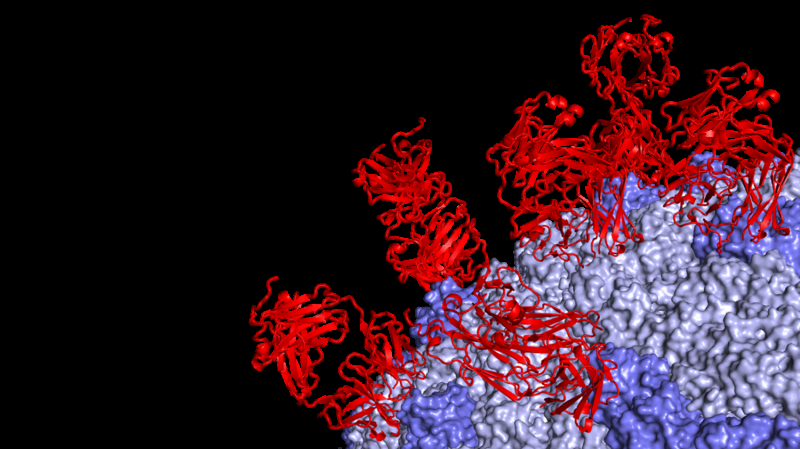A human bi-specific antibody against Zika virus with high therapeutic potential

The journal Cell today published data with a bi-specific antibody against Zika virus infection. The article is titled "A Human Bi-specific Antibody against Zika Virus with High Therapeutic Potential."
The bi-specific antibody, called FIT-1, which comprises the specificities of both human antibodies ZKA190 and ZKA185, was designed by Humabs BioMed using its proprietary CellClone technology. ZKA190 is a potent Zika virus-neutralizing antibody shown to bind to all surface E proteins on the virus particle and able to distort the quaternary viral structure, while ZKA185 binds to a distinctly different site on the virus and helps prevent viral escape. FIT-1 was shown to potently neutralize strains of the Zika virus isolated around the world and the virus was unable to escape from it.
The interaction between virus and antibody was elucidated by a combination of experimental and computational techniques to understand how FIT-1 blocks the infection cycle. The work took advantage of a recently acquired IRB NMR (nuclear magnetic resonance) machine, the IRB being one of the very few laboratories where high resolution magnetic resonance is used to characterize antibodies.
The laboratory of Associate Professor Shee-Mei Lok at Duke-NUS used electron microscopy imaging at liquid nitrogen temperature to examine the binding effect of the ZKA190 antibody to the Zika virus under high magnification. ZKA190 was observed to break the surface structure of the Zika virus particle, thus explaining its high potency in clearing the virus.
The therapeutic potential of FIT-1 was evaluated in vivo by administering three different doses (15, 5 and 1 mg/kg) at three different time points (one, two and three days post infection). While all doses provided protection against infection, the highest dose (15 mg/kg) had survival rates of 100 percent with no signs of morbidity, even when treatment was given three days post infection. No viral escape was detected at any of the dose levels at the measured time point of five days post infection.
Luca Varani, PhD, Group Leader, Structural Biology, Institute for Research in Biomedicine, said: "We have shown that Zika has a remarkable ability to change and evade the human immune response. We designed the FIT-1 bispecific antibody to overcome this problem. The strong collaboration of our research teams allowed us to characterize the interaction between Zika virus and the immune system, spanning from atomic interactions to the molecular level, cells and finally the whole individual. The data we have reported support our design premise and provide a solid basis for bringing FIT-1 forward in development."
"Zika virus infection has turned into a public health threat, particularly due to its association with severe congenital birth defects. The development of an effective vaccine to prevent Zika virus infection poses some risks, and it is important to develop new and alternative approaches," said Davide Corti, PhD, Chief Scientific Officer of Humabs BioMed, a subsidiary of Vir Biotechnology Inc. "The preclinical data published with FIT-1 bi-specific antibody show early signs of efficacy. We plan to conduct further experiments to determine FIT-1's effectiveness in blocking fetal infection. We also hope to explore alternative delivery mechanisms for the antibody that could make it more cost effective and thus more accessible to the parts of the world most in need of cures for this disease."
Associate Prof Shee-Mei Lok from Duke-NUS added: "The FIT-1 antibody has potential to be developed as a therapeutic for the treatment and prevention of Zika virus infection in adults and pregnant women. Hopefully, clinical trials can be accelerated so that the FIT-1 antibody may be used in future outbreaks, as well as to tackle emergency cases of Zika infection in pregnant women."
More information: Jiaqi Wang et al. A Human Bi-specific Antibody against Zika Virus with High Therapeutic Potential, Cell (2017). DOI: 10.1016/j.cell.2017.09.002



















